Unit4ActivitiesafterClass教学设计
- 格式:docx
- 大小:521.15 KB
- 文档页数:4
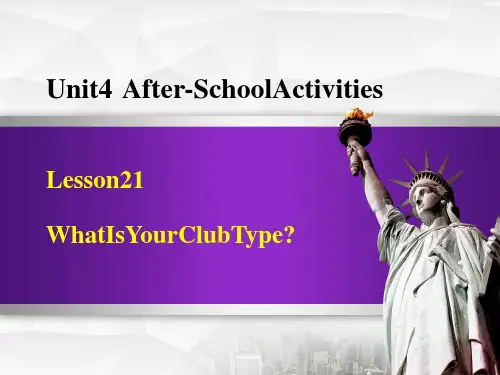
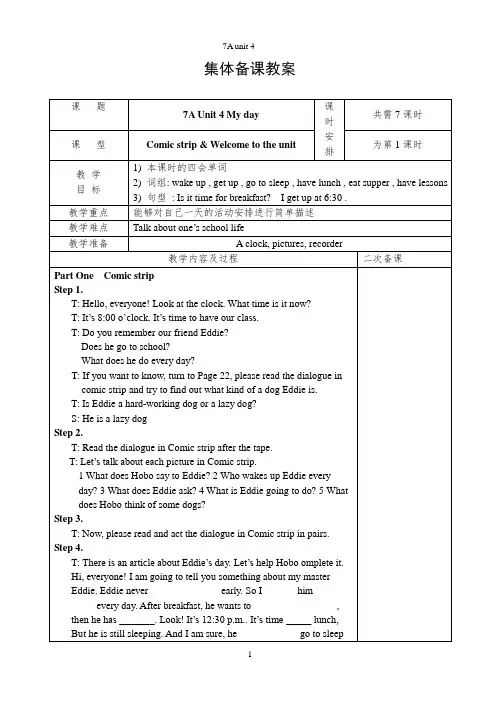
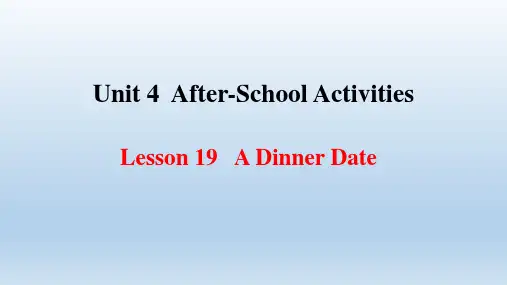
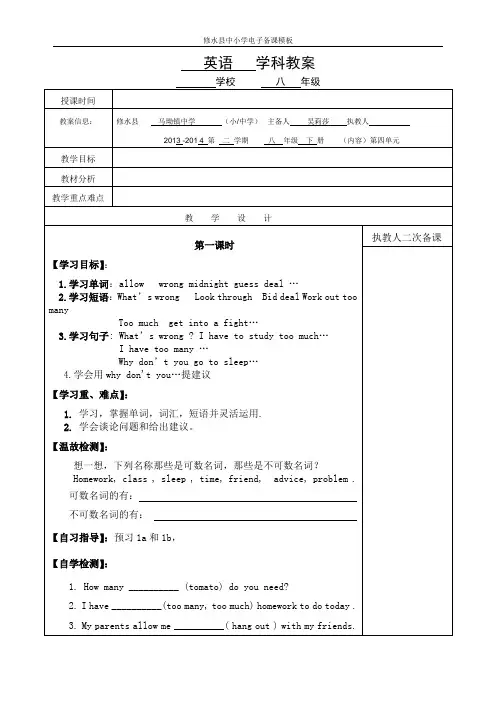
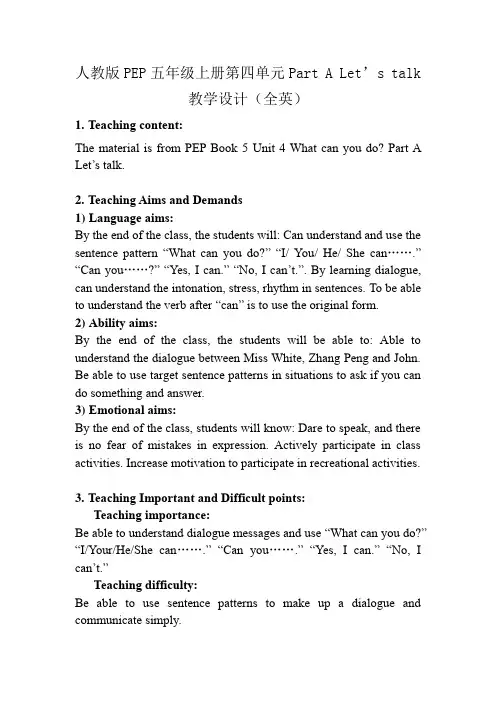
人教版PEP五年级上册第四单元Part A Let’s talk教学设计(全英)1.Teaching content:The material is from PEP Book 5 Unit 4 What can you do? Part A Let’s talk.2.Teaching Aims and Demands1)Language aims:By the end of the class, the students will: Can understand and use the sentence pattern “What can you do?” “I/ You/ He/ She can…….” “Can you……?” “Yes, I can.” “No, I can’t.”. By learning dialogue, can understand the intonation, stress, rhythm in sentences. To be able to understand the verb after “can” is to use the original form.2)Ability aims:By the end of the class, the students will be able to: Able to understand the dialogue between Miss White, Zhang Peng and John. Be able to use target sentence patterns in situations to ask if you can do something and answer.3)Emotional aims:By the end of the class, students will know: Dare to speak, and there is no fear of mistakes in expression. Actively participate in class activities. Increase motivation to participate in recreational activities.3.Teaching Important and Difficult points:Teaching importance:Be able to understand dialogue messages and use “What can you do?” “I/Your/He/She can…….” “Can you…….” “Yes, I can.” “No, I can’t.”Teaching difficulty:Be able to use sentence patterns to make up a dialogue and communicate simply.4.Teaching ProceduresStep 1: PresentationT: Boys and girls, are you interested in stories?Ss: Yes, I am. / No, I am not.T: Alright, let me share a little story with you. Please close your mouth. Watch a video carefully.Ss: Ok.T: And you can try to guess what we are going to learn today.T: Well. The video is over. This is a story about snake and rat. Right? Ss: Yes.T: Smart rat is not eaten by snake, because it runs away from the snake by answering “What can you do?”. All right?Ss: Yes, it is.T: What do you think of rat?Ss: It’s very smart / clever, brave…….T: You are all right. Today, we are going to learn about “What can you do?”.Step 2: ListeningT: Look at the screen, here are two question. We will learn a new dialogue, please listen carefully and choose the answer.Ss: Ok.T: Well, it is very easy. Let’s check the answer. Number one, who can give me an answer?S1: C, he can sing English songs.T: Yes, you are right. Number two, ok, you.S2: …….Step 3: Read togetherT: Ok, boys and girls, let’s listen the recording again, and read it by yourself. Ok?Ss: Ok.T: Well, let’s role-play together. The first group read Zhang Peng’s part, the second group read John’s part, and the third group, the fourth group read Miss White’s part. Understand?Ss: Yes.T: We will have an English party next Tuesday. The third and fourth group, read together.Ss:…….Step 4: Look and sayT: Boys and girls, let’s look at these sentences, these verbs are all original after “can”. For example, “can swim” and “can sing English songs”, right?Ss: Yes!T: Therefore, we can know that the words after “can” are all using the original form. We need to remember this one. Please write it down in a notebook.Ss: Ok, I got it.T: So, each student has a conversation with your partner. I will give you five minutes. Who wants to try, who gets a little red flower! Let’s begin.T: Uh-huh. Which group is willing to say? And the other students need to write down what they say! I will ask you questions later.S1 and S2:………….T: Well down. Which student would try to retell what they said?S3: I can. ……T: Very good. Please sit down. And the whole class, let’s retell together.T/ Ss: …….Step 5: Play a gameT: Next, let's play a little game. The name is Drumming and Passing the Flowers. Now I have a hat. When the music stars, you start moving down. When the music stops, the classmate holding the hathas to stand up and communicate with me. Understand?Ss: Ok.T: Stop! You, stand up. What can you do?S4: I can …….T: Oh, yeah. One more time.T: Stop! Ok, stand up, please. Can you ……S5:…….Step 6: HomeworkT: Ok, this is our homework. You need to fill in these blanks based on the picture. For example, what can he do? He can draw pictures. Understand?Ss: Yes.。
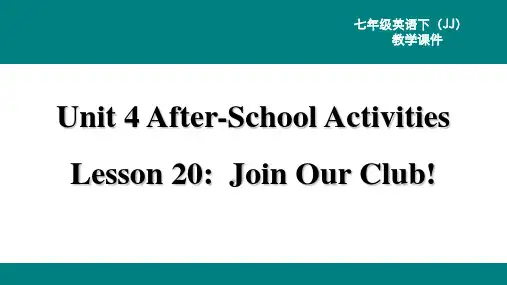
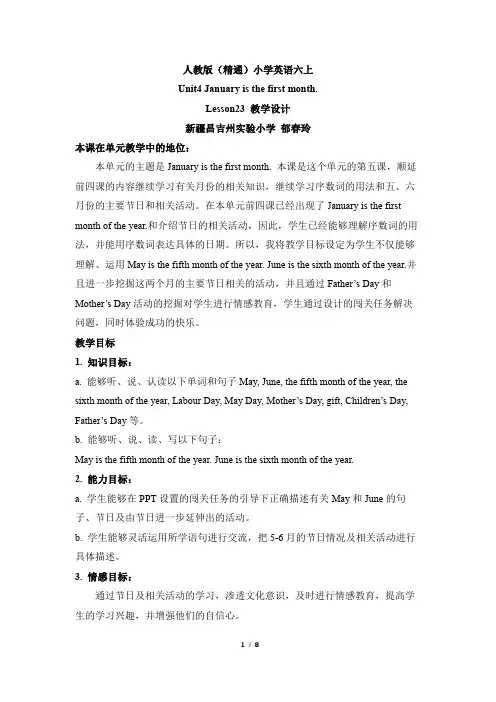
人教版(精通)小学英语六上Unit4 January is the first month.Lesson23 教学设计新疆昌吉州实验小学郁春玲本课在单元教学中的地位:本单元的主题是January is the first month. 本课是这个单元的第五课,顺延前四课的内容继续学习有关月份的相关知识,继续学习序数词的用法和五、六月份的主要节日和相关活动。
在本单元前四课已经出现了January is the first month of the year.和介绍节日的相关活动,因此,学生已经能够理解序数词的用法,并能用序数词表达具体的日期。
所以,我将教学目标设定为学生不仅能够理解、运用May is the fifth month of the year. June is the sixth month of the year.并且进一步挖掘这两个月的主要节日相关的活动,并且通过Father’s Day和Mother’s Day活动的挖掘对学生进行情感教育,学生通过设计的闯关任务解决问题,同时体验成功的快乐。
教学目标1. 知识目标:a. 能够听、说、认读以下单词和句子May, June, the fifth month of the year, the sixth month of the year, Labour Day, May Day, Mother’s Day, gift, Children’s Day, Father’s Day等。
b. 能够听、说、读、写以下句子:May is the fifth month of the year. June is the sixth month of the year.2. 能力目标:a. 学生能够在PPT设置的闯关任务的引导下正确描述有关May和June的句子、节日及由节日进一步延伸出的活动。
b. 学生能够灵活运用所学语句进行交流,把5-6月的节日情况及相关活动进行具体描述。
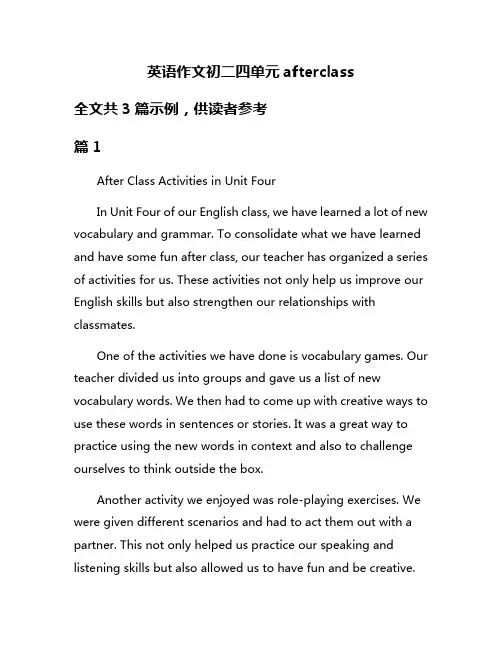
英语作文初二四单元afterclass全文共3篇示例,供读者参考篇1After Class Activities in Unit FourIn Unit Four of our English class, we have learned a lot of new vocabulary and grammar. To consolidate what we have learned and have some fun after class, our teacher has organized a series of activities for us. These activities not only help us improve our English skills but also strengthen our relationships with classmates.One of the activities we have done is vocabulary games. Our teacher divided us into groups and gave us a list of new vocabulary words. We then had to come up with creative ways to use these words in sentences or stories. It was a great way to practice using the new words in context and also to challenge ourselves to think outside the box.Another activity we enjoyed was role-playing exercises. We were given different scenarios and had to act them out with a partner. This not only helped us practice our speaking and listening skills but also allowed us to have fun and be creative.We had scenarios like ordering food in a restaurant, asking for directions, and even negotiating with a shopkeeper. It was a great way to apply what we had learned in class to real-life situations.We also had a spelling bee competition, where we had to spell out words from the unit correctly. This helped us improve our spelling and pronunciation skills while also fostering a sense of healthy competition among us. We cheered each other on and congratulated the winners, creating a positive and supportive learning environment.In addition to these structured activities, our teacher also encourages us to practice our English outside of the classroom. We have language exchange partners from other schools who we can communicate with through emails or video calls. This has been a great way to improve our speaking and listening skills and also learn about different cultures and perspectives.Overall, the after-class activities in Unit Four have been a fantastic way to enhance our English learning experience. They have not only helped us review and practice what we have learned in class but also fostered a sense of camaraderie and cooperation among us. We look forward to more fun and engaging activities in the future units!篇2After Class ActivitiesAfter class activities are an important part of a student's life, especially for middle school students. These activities not only provide a break from the monotony of school work but also help in developing various skills and talents. In this article, we will explore the different types of after class activities that are popular among middle school students and the benefits that they offer.One of the most popular after class activities is sports. Many middle school students participate in various sports such as basketball, football, volleyball, and swimming. Sports not only help in improving physical fitness but also teach important life skills such as teamwork, discipline, and perseverance. Playing sports also helps in relieving stress and improving mood, which can be beneficial for students who may feel overwhelmed with school work.Another popular after class activity is music and dance. Many middle school students participate in music clubs, bands, or dance groups. Learning to play a musical instrument or dance not only helps in developing creativity but also improvesmemory and concentration. Music and dance can also be a great way to express emotions and relieve stress. Being part of a music or dance group also helps in building confidence and social skills.Some students prefer to participate in academic clubs or competitions after class. This includes activities such as debate clubs, science fairs, math competitions, and spelling bees. These activities help in improving critical thinking skills,problem-solving abilities, and knowledge in various subjects. Participating in academic clubs can also boost a student's confidence and self-esteem. Winning competitions can be a great achievement and can motivate students to work harder in their studies.Apart from sports, music, dance, and academic clubs, there are also other after class activities that middle school students can participate in such as art and craft classes, drama clubs, scouting, and community service projects. These activities help in developing creativity, leadership skills, and empathy. Students who participate in these activities often find a sense of purpose and satisfaction in serving others and giving back to the community.In conclusion, after class activities play an important role in the overall development of middle school students. These activities not only provide a break from academic work but also help in developing various skills and talents. Whether it is sports, music, academic clubs, or community service projects, there is something for every student to explore and excel in. It is important for students to balance their academic work with after class activities to lead a well-rounded and fulfilling life.篇3After School Activities at Junior High SchoolAfter a long day of classes at junior high school, many students look forward to participating in after school activities. These activities provide students with the opportunity to socialize with their classmates, develop new skills, and relax after a day of studying. At our school, there are a wide variety of options for students to choose from, ranging from sports teams to academic clubs to artistic pursuits.One popular after school activity at our school is the soccer team. The team practices several times a week and competes in games against other schools. Joining the soccer team is a great way for students to stay active and build teamwork skills. Manystudents also enjoy participating in the school's art club, where they can express their creativity through drawing, painting, and other artistic activities. The art club meets once a week and often collaborates on projects to decorate the school.For students who are interested in academics, there are also several options for after school activities. The math club meets regularly to work on challenging problems and prepare for math competitions. The science club conducts experiments and learns about different scientific concepts. These clubs offer students the opportunity to delve deeper into subjects that they are passionate about and to connect with other students who share their interests.In addition to these structured activities, many students choose to spend their afternoons studying in the school library or working on homework in the computer lab. These quiet spaces provide a productive environment for students to focus on their assignments and seek help from teachers when needed. Students who are struggling in a particular subject can also attend tutoring sessions after school to receive extra support.Overall, after school activities play an important role in the lives of junior high school students. They offer students the chance to pursue their interests, make new friends, and developimportant skills. Whether it's playing sports, creating art, or studying for a math competition, there is something for everyone to enjoy after the final bell rings. So, the next time you find yourself with some free time after school, consider joining an activity and expanding your horizons. You never know what new passions you might discover!。
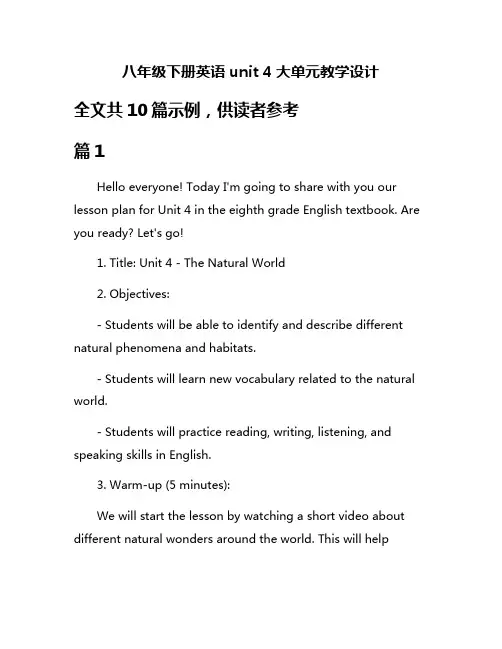
八年级下册英语unit 4大单元教学设计全文共10篇示例,供读者参考篇1Hello everyone! Today I'm going to share with you our lesson plan for Unit 4 in the eighth grade English textbook. Are you ready? Let's go!1. Title: Unit 4 - The Natural World2. Objectives:- Students will be able to identify and describe different natural phenomena and habitats.- Students will learn new vocabulary related to the natural world.- Students will practice reading, writing, listening, and speaking skills in English.3. Warm-up (5 minutes):We will start the lesson by watching a short video about different natural wonders around the world. This will helpstudents get excited about the topic and activate their prior knowledge.4. Vocabulary Building (15 minutes):We will introduce new vocabulary words related to the natural world, such as "ecosystem", "biodiversity", "conservation", etc. Students will work in pairs to match the words with their definitions and discuss examples of each concept.5. Reading Comprehension (20 minutes):Students will read a passage about the Amazon Rainforest and answer comprehension questions afterwards. This will help them practice their reading skills and learn more about one of the most diverse ecosystems in the world.6. Listening Exercise (15 minutes):We will listen to a recording of different animal sounds and ask students to identify each animal. This will help them improve their listening skills and learn more about the various habitats where these animals live.7. Speaking Activity (20 minutes):Students will work in groups to create a presentation about a specific natural phenomenon or habitat. They will have todescribe the location, climate, flora and fauna, and any conservation efforts in place. This will help them practice their speaking skills and work on their communication abilities.8. Writing Task (15 minutes):Students will write a short paragraph about their favorite natural wonder and why they find it fascinating. They will also have to use at least three new vocabulary words from the lesson. This will help them practice their writing skills and consolidate their knowledge of the new vocabulary.9. Review and Homework (5 minutes):We will review the key points of the lesson and assign homework, which will include reading a passage about a different natural habitat and answering comprehension questions.That's it for our lesson plan on Unit 4 - The Natural World! I hope you all enjoyed it and learned something new today. See you next time! Bye bye!篇2Hello everyone! Today I'm going to share with you the lesson plan for Unit 4 in the eighth grade English class. This unitis all about famous people and their achievements, so let's get started!First, we will start off by introducing the topic of the unit with a short video or a fun activity to get students interested. We can talk about different famous people from history or present day and what they are known for.Next, we will move on to the vocabulary and grammar lessons. We can introduce new words related to the topic such as "inventor", "scientist", "composer" and so on. We can also review grammar points like past simple tense, comparatives and superlatives to talk about the achievements of these famous people.After that, we can have a reading comprehension activity where students read a short passage about a famous person and answer questions to test their understanding. This will help them practice their reading skills and learn more about different individuals who have made an impact on the world.For the speaking and listening activities, we can have group discussions or role plays where students pretend to be a famous person and talk about their accomplishments. This will help them practice speaking and listening skills in a fun and interactive way.Finally, we can end the lesson with a creative project where students can choose a famous person to research and present to the class. They can create a poster, a PowerPoint presentation or even a short skit to showcase what they have learned.I hope you all enjoy this lesson plan for Unit 4 and have fun learning about famous people and their achievements. Let's make this unit a memorable one!篇3Hello everyone! Today I'm going to share with you the teaching plan for Unit 4 in the eighth grade English textbook. This unit is all about technology, and we have lots of fun activities planned to help you learn.First, we will start off with a warm-up activity to get us thinking about technology. We will watch a short video about the history of computers and discuss it as a class. This will help us understand how far technology has come and how it has changed our lives.Next, we will move on to the vocabulary section. We will learn new words related to technology, such as "smartphone," "tablet," and "internet." We will practice using these words in sentences and have a vocabulary quiz at the end of the week.After that, we will move on to grammar. In this unit, we will focus on the present perfect tense. We will learn how to form the present perfect, when to use it, and practice using it in our speaking and writing.In the reading section, we will read an article about the future of technology. We will discuss the predictions made in the article and talk about how these advancements could change our lives in the future.For the speaking activity, we will work in pairs to discuss the pros and cons of technology. We will practice expressing our opinions and listening to others' viewpoints.In the writing section, we will write a short paragraph about our own experiences with technology. We will talk about our favorite gadgets, how technology has helped us in our daily lives, and any concerns we have about the impact of technology on society.At the end of the unit, we will have a technology fair where you can showcase a project related to technology. This could be a presentation, a poster, or even a short skit. This will be a fun way to demonstrate what you have learned and show off your creativity.I hope you are excited for Unit 4 and ready to learn all about technology. Let's have a great time exploring the world of tech together!篇4Hello everyone! Today I'm going to share with you my teaching plan for the 8th Grade Unit 4 in English class. This unit is all about travel and destinations, so it's going to be super fun and exciting!First, we will start with a warm-up activity to get everyone excited about the topic. We can play a game called "Destination Race" where students have to answer questions about different countries and their famous landmarks. It will be a great way to test their knowledge and get them thinking about different places around the world.Next, we will move on to the main lesson where we will learn vocabulary words related to travel and destinations. We can use flashcards, pictures, and even role-playing activities to help students understand and remember the new words. For example, we can pretend to be tourists at a famous landmark and practice asking for directions in English.After that, we will work on grammar and sentence structures related to travel. We can do exercises on using prepositions of place, past tense verbs for talking about past trips, and using question words for asking about travel plans. It will be important for students to practice using the correct grammar when talking about their own travel experiences.To wrap up the lesson, we can have a group discussion where students can share their dream travel destinations and why they want to visit them. It will be a great way for students to practice speaking in English and expressing their opinions in a fun and engaging way.Overall, I'm really excited to teach this unit and I know it's going to be a great learning experience for everyone. I can't wait to see all the amazing places we will explore together! Let's get ready for an adventure in English class!篇5Hello everyone! Today I want to share with you my exciting lesson plan for Unit 4 of the eighth grade English textbook. This unit focuses on the theme of "Healthy Living", and we will be learning all about how to stay healthy and fit.To start off the lesson, I will introduce the topic of healthy living by discussing why it is important to eat well and exercise regularly. We will have a class discussion about the benefits of a healthy lifestyle and share our own experiences with staying healthy.Next, we will dive into the vocabulary and grammar of the unit. I will introduce new words related to health and fitness, such as "nutrition", "exercise", and "balanced diet". We will also practice using these words in sentences and conversations to help reinforce our understanding.After that, we will move on to the reading and writing activities in the textbook. We will read a passage about different ways to stay healthy, and discuss the main ideas and key points. Then, we will work on writing our own tips for healthy living, using the vocabulary and grammar we have learned.To wrap up the lesson, we will play some fun games and activities to review the material we have covered. We might do a health and fitness quiz, a role-playing activity about making healthy choices, or even a mini workout session to get our bodies moving!I hope you are all excited for this unit on healthy living. Let's work hard and have fun learning together! Remember, a healthybody leads to a healthy mind. Let's do our best to stay fit and happy!篇6Hello everyone, I am going to share with you the teaching plan for Unit 4 of the eighth grade English textbook.First, we will start with the warm-up activity. We can play a game called "Word Chain" where students have to think of a word related to the previous one given by the teacher. This will help activate students' prior knowledge and get them engaged in the lesson.Next, we will move on to the vocabulary section. We can introduce new words by showing pictures and asking students to guess the meaning. Then, we can play a matching game where they have to match the word with its definition. This will help students remember the new vocabulary better.After that, we will focus on the grammar points of the unit. We can teach them the present perfect tense using real-life examples. For example, we can ask students if they have ever been to a foreign country and they can make sentences using the present perfect tense.Following the grammar portion, we can move on to the reading comprehension section. We can choose a passage related to the topic of the unit and ask students to read it silently. Then, we can ask comprehension questions to check their understanding. This will also help improve their reading skills.For the writing practice, we can ask students to write a short paragraph about their own experiences using the present perfect tense. This will give them an opportunity to apply what they have learned in a creative way.Finally, we can end the lesson with a group discussion where students can share their paragraphs with their classmates. This will promote speaking and listening skills as well as encourage peer interaction.In conclusion, this teaching plan aims to help students learn the content of Unit 4 in a fun and interactive way. By incorporating various activities such as games, matching exercises, reading comprehension, and writing practice, we can ensure that students are actively engaged and motivated to learn. Let's have a great lesson together!篇7Hello everyone! Today I'm going to share with you the teaching plan for Unit 4 in the eighth grade English textbook. This unit is all about "Science and Technology", and we are going to have so much fun learning new words and ideas together.First, we will start by introducing the vocabulary related to science and technology. We will learn words like "experiment", "invention", and "innovation". We will also talk about famous scientists and their discoveries, such as Isaac Newton and Albert Einstein.Next, we will move on to grammar and sentence structure. We will practice using the present perfect tense to talk about past experiences and achievements. For example, "I have never seen a shooting star before" or "She has invented a new gadget".After that, we will focus on reading and comprehension. We will read articles about the latest technological advancements and discuss their impact on society. We will also do some reading exercises to improve our reading skills.In the speaking and listening activities, we will practice having conversations about science and technology. We will work in pairs or groups to discuss topics like space exploration, artificial intelligence, and climate change. It will be a great opportunity to improve our communication skills.Finally, we will end the unit with a project presentation. Each student will choose a topic related to science and technology and prepare a presentation to share with the class. This will be a chance for us to showcase our knowledge and creativity.I hope you are all excited about learning and exploring the world of science and technology in Unit 4. Let's have a great time together and make some amazing discoveries! Thank you for listening and let's get started!篇8Unit 4 in our eighth-grade English textbook is all about exploring different cultures and traditions around the world. In this unit, we will learn about different countries, their customs, food, music, and holidays. It's going to be super interesting and fun!To start off the unit, our teacher will introduce us to the concept of culture and why it's important to learn about different cultures. We will talk about the differences and similarities between cultures and how we can appreciate and respect diversity.Next, we will dive into specific countries and their traditions. We will learn about famous landmarks in different countries, trytraditional foods, and even listen to some music from around the world. It's going to be like a mini world tour right in our classroom!One of the highlights of this unit is going to be learning about festivals and holidays from different cultures. We will explore celebrations like Diwali in India, Chinese New Year in China, and Day of the Dead in Mexico. We might even get to participate in some fun activities related to these festivals.Throughout the unit, we will have interactive activities, group projects, and even presentations to showcase what we have learned. We will also have quizzes and games to test our knowledge and make learning even more exciting.By the end of this unit, we will have a better understanding and appreciation of different cultures around the world. We will have learned how to embrace diversity, respect traditions, and celebrate differences. It's going to be an amazing journey of discovery and learning for all of us!So get ready, class, for an adventure like no other as we set out to explore the wonderful world of cultures and traditions in Unit 4 of our eighth-grade English class. Let's make this journey together and have a blast learning about the rich tapestry of our world!篇9Unit 4 in our eighth-grade English textbook is super exciting! In this unit, we will be focusing on different aspects of society and social issues. We will learn about different cultures, human rights, and environmental problems. It's going to be so much fun!To kick off the unit, we will start by discussing cultural differences and similarities. We will talk about different customs, traditions, and beliefs from around the world. We will also learn how to respect and appreciate diversity in society.Next, we will dive into the topic of human rights. We will learn about the Universal Declaration of Human Rights and discuss the importance of treating every individual with dignity and respect. We will also explore different human rights issues that people face in society today.After that, we will shift our focus to environmental problems. We will learn about the impact of pollution, deforestation, and climate change on our planet. We will also discuss ways in which we can help protect the environment and make a positive impact on the world.Throughout the unit, we will engage in various activities such as group discussions, debates, and presentations. We will also work on improving our reading, writing, listening, and speaking skills through a variety of exercises and assignments.I am so excited to learn about these important topics and I can't wait to share my opinions and ideas with my classmates. I know that by the end of this unit, I will have a better understanding of society and be more aware of the world around me. Let's make Unit 4 the best one yet!篇10Hello everyone! Today I'm going to share with you the teaching plan for Unit 4 in the eighth grade English textbook.First, let's start with the goals of this unit. By the end of this unit, students should be able to:1. Understand and use vocabulary related to sports and leisure activities.2. Describe their favorite sports and hobbies.3. Talk about past experiences and future plans.4. Write a short paragraph about their leisure activities and preferences.Now, let's move on to the activities for this unit:1. Warm-up: To start the lesson, we can do a quick review of the vocabulary from the previous units related to sports and hobbies. We can also show some pictures of different sports and leisure activities and ask students to guess the names.2. Vocabulary building: Introduce new vocabulary related to sports and hobbies through a matching game or a flashcard activity. Encourage students to use the new words in sentences to practice their speaking skills.3. Listening practice: Play an audio recording of people talking about their favorite sports and hobbies. Ask students to listen carefully and answer questions about the speakers' preferences.4. Speaking practice: Divide students into pairs or small groups and have them talk about their own favorite sports and hobbies. Encourage them to ask questions to each other to practice their conversation skills.5. Writing activity: Ask students to write a short paragraph about their leisure activities and preferences. Provide them with sentence starters and vocabulary to help them compose their paragraphs.In conclusion, this unit aims to improve students' vocabulary, speaking, listening, and writing skills in English. I hope this teaching plan will help you in preparing for your lessons. Let's have fun learning together!。
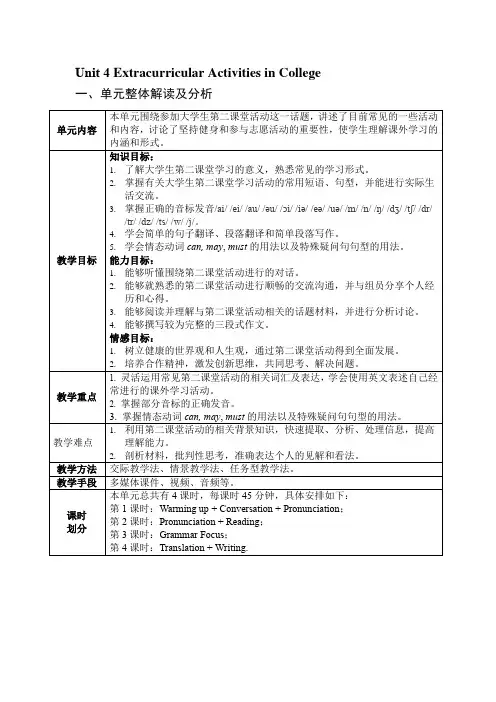
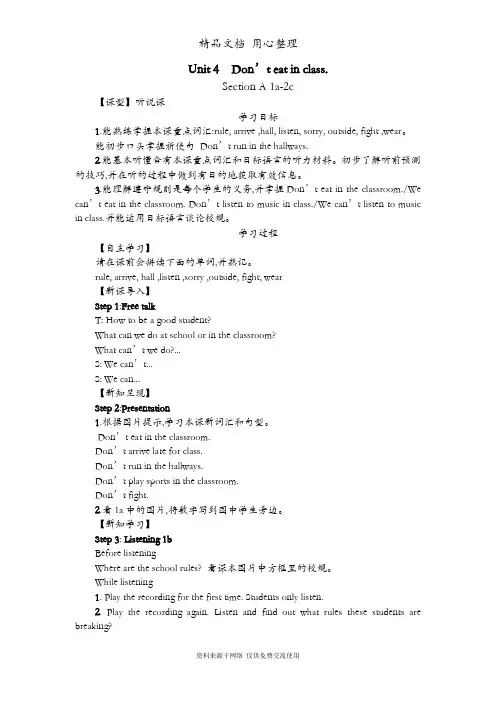
Unit 4 Don’t eat in class.Section A 1a-2c【课型】听说课学习目标1.能熟练掌握本课重点词汇:rule, arrive ,hall, listen, sorry, outside, fight ,wear。
能初步口头掌握祈使句Don’t run in the hallways.2.能基本听懂含有本课重点词汇和目标语言的听力材料。
初步了解听前预测的技巧,并在听的过程中做到有目的地获取有效信息。
3.能理解遵守规则是每个学生的义务,并掌握Don’t eat in the classroom./We can’t eat in the classroom. Don’t listen to music in class./We can’t listen to music in class.并能运用目标语言谈论校规。
学习过程【自主学习】请在课前会拼读下面的单词,并熟记。
rule, arrive, hall ,listen ,sorry ,outside, fight, wear【新课导入】Step 1:Free talkT: How to be a good student?What can we do at school or in the classroom?What can’t we do?...S: We can’t...S: We can...【新知呈现】Step 2:Presentation1.根据图片提示,学习本课新词汇和句型。
Don’t eat in the classroom.Don’t arrive late for class.Don’t run in the hallways.Don’t play sports in the classroom.Don’t fight.2.看1a中的图片,将数字写到图中学生旁边。
【新知学习】Step 3: Listening 1bBefore listeningWhere are the school rules? 看课本图片中方框里的校规。
Unit 4 Don’t eat in class。
Step 4 listening (1b)Listen & put an for things Dave can't do &a for things He has to do.Rules Can’t Have to/must Whena go out On schoolnightssee friendsdo his homeworkPractice the guitarDo the dishesWatch TVHelp his mom make breakfastClean his roomPlay the recording, Ss listen &Check the answers。
Step5 (1c)Listen again。
Write when Dave has to follow the rules in the chart in (1b). Choose from the phrases in the box。
Ss listen carefully;check the answers with the class.on school nights every Saturday before dinner in the eveningon school day after dinner after school every morningStep 6 Talk about the rules in Dave’s house。
(1d)eg:Can Dave go out on school nights?No, he can't. etc.Step 7 Report Dave’s rules。
See who is the best?He can’t go out o n school nights。
He can’t see his friends on school days。
Unit4 After-School ActivitiesLesson 19: A Dinner Date一、教材分析本节课是冀教版七年级下册英语第四单元第19课。
话题是Talk about weekend activities and personal interests,语法是be going to 的用法。
本单元的话题是课外活动,非常贴近学生的生活,学生通过学习与课外活动相关的短语和be going to句型表达一般将来时的用法,能够结合自己实际情况,.谈论自己关于周末活动的计划和打算。
让学生在合作交流中参与活动,体验语言功能带来的收获。
本节课是本单元的第一节,提供了词汇和句型,使学生在谈论课外活动的同时,学会一些生词和短语,掌握be going to的用法,了解中外课余活动的差异。
我充分利用教材贴近学生生活的特点,在课堂上对学生进行英语听、说、读、写的训练,全面提高学生对语言的综合运用能力,并且渗透了学生对课余生活合理安排的情感教育,促进学生心智发育。
学好本节课,使学生初步掌握课余活动的一些短语、 be going to的用法,能用所学英语知识谈论自己的兴趣和爱好,为以后的学习打下扎实基础。
二、学习者特征分析1、七年级学生的心理特征和认知发展水平:七年级学生喜欢直观、形象的教学活动,他们有较高的求知、表现欲,对课余活动的话题感兴趣,他们注意力集中时间短,但已具备一定的语言沉淀,形成一定的学习策略。
因此,我设计的课堂活动更多的考虑了学生在已有知识体系上的建构和语言生成,让人人都能参与,增强他们学习英语的积极性和自信心。
2、七年级学生的英语语言知识和技能水平:他们通过小学和初中第一学期的学习,已经积累了一定的词汇量,能用英语表达一些课余活动的词汇,能使用简单的语言表达自己的想法,他们已经拥有简单听说读写能力。
本节课生词不多,短语贴近生活,易于记忆,因此学生在词汇学习过程中没有太大困难,主要难点是be going to的用法。
Unit 4After-SchoolActivitiesLesson 19 A dinner dateI Learning aims1To learn the new words and phrases: activity, volleyball, practice,chess, club, both, nothing and come over, do well in.2The main sentence: How about …? Would you like to …?3Students can use “ be goingto ” structure.H Learning key points1The new words and phrases in this lesson.4The main sentence structure: How about …? Would youmkectolt …?pointsThe usageof “ be going to ”IV Learning tips(一)Self -learning1Review( 5min )1)She is doing well. There is __ to worry about.A somethingB anythingC nothingDeve rything2) What about ____ a rest?A to haveB hadC haveD having3) Would you like one of the moon cake?A Yes, pleaseB yes, I wouldC no, pleaseD no, I donX) Grammars'(1t(min)be going to 结构:肯定句:主语+be +going to do sth否定句:主语+be+ not +going to do sth一般疑问句:Be +主语+ going to do sth ?肯定答语:Yes主语+be.否定答语:No,主语+be +not特殊疑问句:特殊疑问词+be+主语+ going to do sth ?(三) Consolidations(15min)1我们打算搬到纽约去。
《Volunteer Work Warming Up》教学设计方案(第一课时)一、教学目标1. 学生能够理解并表达志愿者工作的观点和重要性。
2. 学生能够用英语谈论志愿者工作的各种类型和活动。
3. 学生能够通过小组讨论和角色扮演等方式,提高团队协作和沟通交流能力。
二、教学重难点1. 重点:理解并表达志愿者工作的观点、类型和活动。
2. 难点:运用英语进行志愿者工作的相关讨论和表达。
3. 教学方法:采用小组讨论、角色扮演等互动式教学方法,帮助学生提高口语表达和团队协作能力。
三、教学准备1. 准备教学PPT,包含相关图片、视频和文字资料。
2. 准备志愿者工作相关英文词汇和表达的卡片。
3. 准备小组讨论和角色扮演所需道具,如纸、笔、假面具等。
4. 提前邀请相关志愿者工作者参与教室教学,分享他们的经验和故事。
四、教学过程:1. 热身活动(Warming up)(1) Greeting students and reviewing the vocabulary they learned in previous lessons.(2) Play a short video about volunteering work. Ask students to predict what the video will show and then discuss their ideas after the video is finished. This will help students to understand that volunteering is a kind of work that can help others and make them feel happy.(3) Brainstorming: Ask students to list as many volunteering activities as possible in English. This will help students to broaden their vocabulary and improve their communication skills.(4) Pair work: Ask students to work in pairs and discuss what kind of volunteering work they would like to do in the future. This will help students to better understand their interests and goals, and also improve their communication and cooperation skills.2. Presentation and Practice(1) Greetings: Review the language points related to time and days of the week. Introduce the topic of volunteering work by asking students what they have learned about volunteering work from the video and brainstorming activities.(2) Presentation: Introduce some common volunteering activities, such as teaching English, helping the elderly, cleaning up the environment, etc., and introduce some related vocabulary.(3) Practice: Divide students into groups of three or four, and give them some tasks related to volunteering work. For example, they can write a letter of application for a volunteering position, or make a presentation about a volunteering activity they are interested in. Thiswill help students to improve their writing and speaking skills, and also help them to better understand the content of the lesson.3. Consolidation and Summary(1) Consolidation: Ask students to repeat the vocabulary they have learned and discuss how they can use them in real life situations. This will help students to consolidate their knowledge and improve their communication skills.(2) Summary: Summarize the main points of the lesson and encourage students to recall what they have learned from the lesson. Also, encourage them to share their ideas about volunteering work with their classmates.4. Homework(1) To practice the language points related to time and days of the week, ask students to complete some exercises related to these topics.(2) To find some more information about volunteering work and share it with their classmates after class.教学设计方案(第二课时)一、教学目标1. 学生能够理解并应用与志愿者工作相关的词汇和表达,如“volunteer”,“help”,“work with”等。
Unit 4 Was Einstein a space Alien?Students will be able to:1. Grasp the main idea of Text A(Einstein was a child of his time)2. Appreciate the various techniques employed by the writer(using a question as the title of the text, illustrating his answer with various supporting facts, use if subheadings, use of quotations , etc.)3.Master the key language points in Text A and learn how to use them in context;4.Understand the cultural background related to the content;1.Express themselves more freely on the theme2.Write an essay paying special attention to unity.We devote 8 teaching periods (plus 2 periods after-class of students’ autonomous learning in theText A Writing Three Thank-you LettersTony PhillipsAlbert Einstein (1879 — 1955) German-born American theoretical physicistHe was a German-born American theoretical physicist whose special and general theories of relativity revolutionized modern thought on the nature of space and time and formed a theoretical base for the exploitation of atomic energy. He won a 1921 Nobel Prize for his explanation of the photoelectric (光电的) effect.Isaac Newton (1643 — 1727) English mathematician and scientistHe was an English mathematician and scientist who invented differential calculus (微分学) and formulated the theory of universal gravitation, a theory about the nature of light, and three laws of1-3: A young husband and father, Albert Einstein had to work hard to support his family.4-12:Einstein made astonishing achievements in physics and thus revolutionized the field.13-21:Einstein’s discoveries were attributable to his imagination, questioning, disregard for authority, powers of concentration, and interest in science.22-23:Einstein was not a space alien.1.His hair was a mess; he had forgotten to comb it again.What do the words “mess” and “again” suggest about Einstein?These words suggest two things about Einstein:1) Einstein paid little attention to his appearance.2) It was more a regular practice than an accident forEinstein to go to work with messy hair.Translate the sentence into Chinese.他的头发凌乱,他又忘了梳头了。
Unit4ActivitiesafterClass教学设计Teaching design of Unit4 activities after class
Unit4ActivitiesafterClass教学设计
前言:小泰温馨提醒,英语作为在许多国际组织或者会议上都是必需语言,几乎所有学校
选择英语作为其主要或唯一的外语必修课。
英语教学涉及多种专业理论知识,包括语言学、
第二语言习得、词汇学、句法学、文体学、语料库理论、认知心理学等内容。
本教案根据
英语课程标准的要求和针对教学对象是小学生群体的特点,将教学诸要素有序安排,确定
合适的教学方案的设想和计划、并以启迪发展学生智力为根本目的。
便于学习和使用,本
文下载后内容可随意修改调整及打印。
unit 4 activities after classlesson 7teaching aims:knowledge aim:enable the ss to grasp the
words :basketball,football,ping-
pong,sport,pass,catch,shot.the sentences:what are they doing?they’re doing sth.ability aim:can talk about the activities and the favorite sport with the simple aim:educative the ss to do exercise every day.main
points:foster the ss’ asking and answering
abilities.difficult points:talk about the activities and
the favorite sport materials: tape recorder, pictures, steps :
step 1 warm-up/ review
1.daily greeting:t: good morning ,class. nice to see
you again.”ss: good morning , miss chen . nice to see
you ,too.”
2.sing the song: the music room.step 2 leading
1.show the cards and review the words: run,
swim,sing,dance,boat, play, etc . present them and let
the ss listen and repeat.
2.say the rhyme: running,running,i am
running.swimming,swimming,you are
swimming.singing,singing,he is
singing.dancing,dancing,she is
dancing.boating,boating,we’re
boating.playing,playing,we’re playing.step 3
presentation
1.learn to say
1) to learn the new words and sentences t: football,look,i’m playing football. (say and act)ss:playing,playing, playing football. t: what are they doing? ss: they’re playng football.to learn “pass
the ball,catch the ball”,make the ss say and act.
2) play a game----listen and do. the
teacher show the card,let the ss act.
3) listen to the tape first,then read after the tape.step 4 consolidation.
1.ask and answer: what are they doing? they’re….
2.do a survey:what’s your favorite sport?
3.learn to sing: row your boat.step 5 homeworklisten to the tape & repeat and talk them in daily life..finish off the activity book of lesson 7.
-------- Designed By JinTai College ---------。